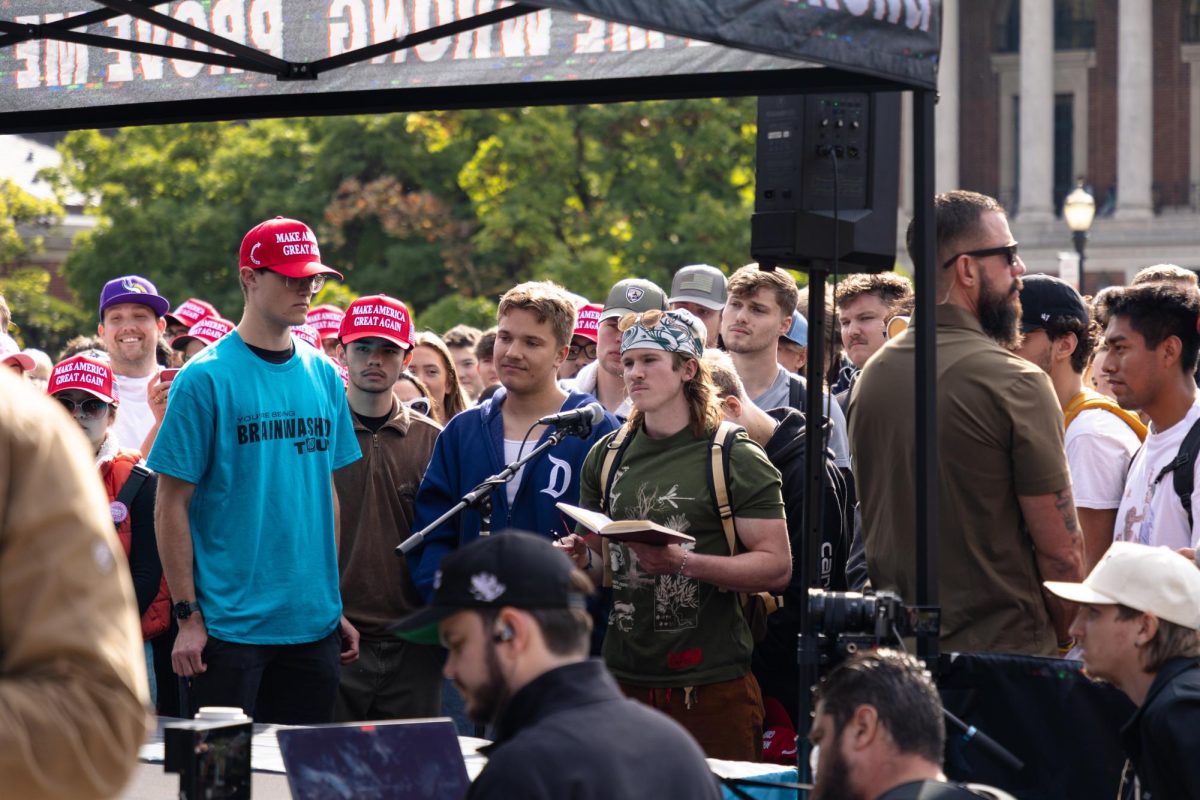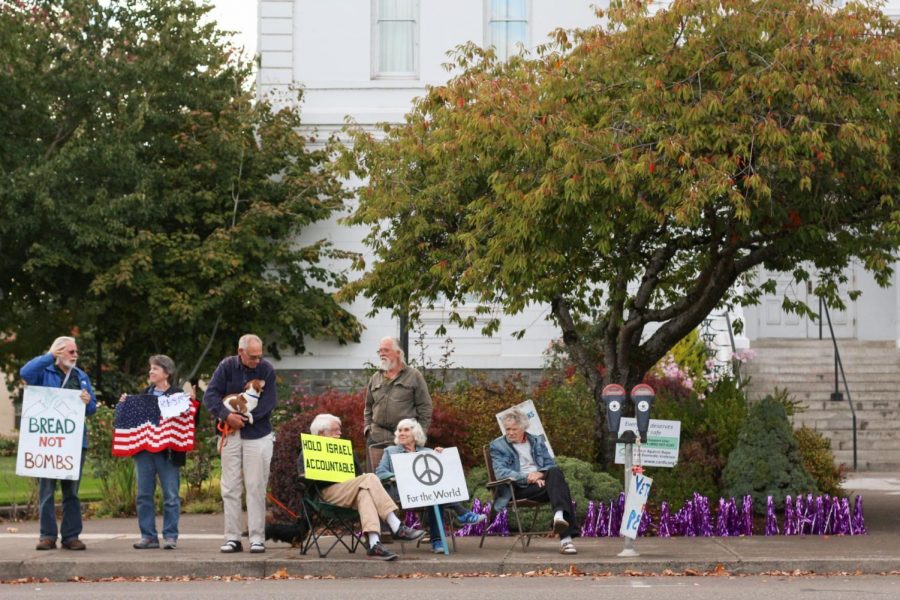The longest protest
October 22, 2018
October 7, 2018 marked the seventeenth anniversary of the United States invasion of Afghanistan, but one day later also marked the seventeenth anniversary of a peace protest held outside of the Benton County Courthouse every day since the first Special Forces hit the sands of Balkh Province.
Approximately 10,142 days ago the U.S. began Operation Desert Storm and dropped roughly 88,500 tons of bombs over Baghdad in 39 days. It marked the United States’ first major military conflict in the Middle East, but not the last. The United States began its invasion of Afghanistan 3916 days later, after the infamous attack on the World Trade Center.
It was in the weeks leading up to Operation Enduring Freedom, that a group of approximately 75 Corvallis citizens came together at the Westminster House on 101 NW 23rd St., and strategized their own plans for bringing awareness to this impending conflict, and a new era of dangerous wars on terrorism. In this meeting they came to the consensus that there needed to be a declaration of war cast against the government’s endless wars on the people of the Middle East. Only this war would not be fought with bullets and bombs, but with words and pictures.
On October 7, 2001, when the military officially began its bombardment of Taliban training sights, these 50-100 citizens of Corvallis decided to hold a vigil outside of the Benton County Courthouse, protesting what would become the second longest war ever waged by America. On Oct. 22, 2018, from 5 – 6 p.m., in rain or shine, the people of this same vigil will be on the front sidewalk of your courthouse, holding signs for the 6,219th consecutive day since our war in Afghanistan began.
Each one of these days begin with a man named Ed Epley pulling up to the curb in his 60s red Volkswagen bus. In the back he has hundreds of anti-war signs stacked to the windows, some harkening back to this protests very first days. It also serves as a testament to the amount of time these men and women have spent on the front lawn of the Courthouse.
“Think about what this place would look like if it were a warzone, fraught with craters, burning rubble and firing all around,” Epley said. “It’s really hard to imagine what it would be like here, but a lot of the world is that way. We’re just here reminding people that there is still a war going on and it’s still affecting people’s lives.”
Epley began going to the Courthouse just a week after the first protests began, and continues to go almost every day.
“It’s like waking up, or going to bed or eating; it’s just part of the day for me,” Epley said.
There’s a lot that that our government could do to reduce the amount of resources being expended for the war effort, but Epley believes that there is only one thing to do if you are a citizen: to peacefully protest. Still, there are many who believe that holding sings doesn’t help to change government at all.
“If there is a different answer, that is also a productive one and not a destructive one, then I am interested in hearing it,” Epley said.
Gene Russell, another frequent peace protester and an Army veteran of the Vietnam War, explains that if everyone were out there waving signs and bringing attention to the war then something would change for sure.
“But only three or four people go out there and do that, and nothing happens. People need to actually go out and make it happen,” Russell said.
When Russell explained that when he came home from the war, he was left alone and almost no one ever wanted to hang out with him.
“I felt pretty lonely out here. I felt like we were involved in a situation in the Army where we were basically wasted, and not worthy of being around,” Russell said.
Russell believes that the perception of war has changed since then, but the sentiment is still an apathetic one.
Protester, Delbert McColms, says that this sentiment is something that’s gotten a lot worse in recent decades because of technology and the rapidly expanding news media.
“People need to be less entertained and distracted, and need to be more informed,” McColms said.
McColms believes that the government is caught up in a pointless quagmire of war which is putting our resources to bad use.
“There are things we need to be doing. We need to take care of our population, instead of having people out sleeping in the streets,” McColms said. “War is the biggest waste that you can get. They need to put their Napoleon suits back in the closet and stop trying to rule the world.”
City Council member and an original founder of the protest Bill Glassmire, says that the response from the people is mostly positive, but it entirely depends on how recently a war has been declared.
“If we started a war tomorrow, you’d see people coming by with their middle fingers extended and revving engines, but right now there is a lot of quiet war going on that is costing us money, lives and resources. But most of us don’t think about it,” Glassmire said.
José-Antonio Orosco, professor of Philosophy at Oregon State University believes that this peace protest came out a very emotional time in American history, when people were reeling from both the destruction of the World Trade Center and scared of the prospect that inevitably, a war would be crafted out of the people’s anger.
“Corvallis joined the global march against the invasion of Iraq in February of 2003 (the largest protest in human history with millions of people across the globe), and had regular rallies and marches for many years to mark the anniversaries of the start of the wars in Afghanistan and Iraq,” Orosco via email.
Orosco says that the Courthouse Vigil served as a beacon for all of those events and became a place where peace activists could regularly find one another. To Orosco, protests like these are more about creating solidarity, keeping spirits up and strengthening the willpower of like-minded people.
“I think the Courthouse vigil has been more about bearing witness to the ongoing wars and having a place for peace activists to see each other regularly,” Orosco writes.
Ed Epley doesn’t know how much longer this war of attrition will last, but predicts that they might be continuing their own war of attrition through peaceful protest for many more cold winters to come.










































































































